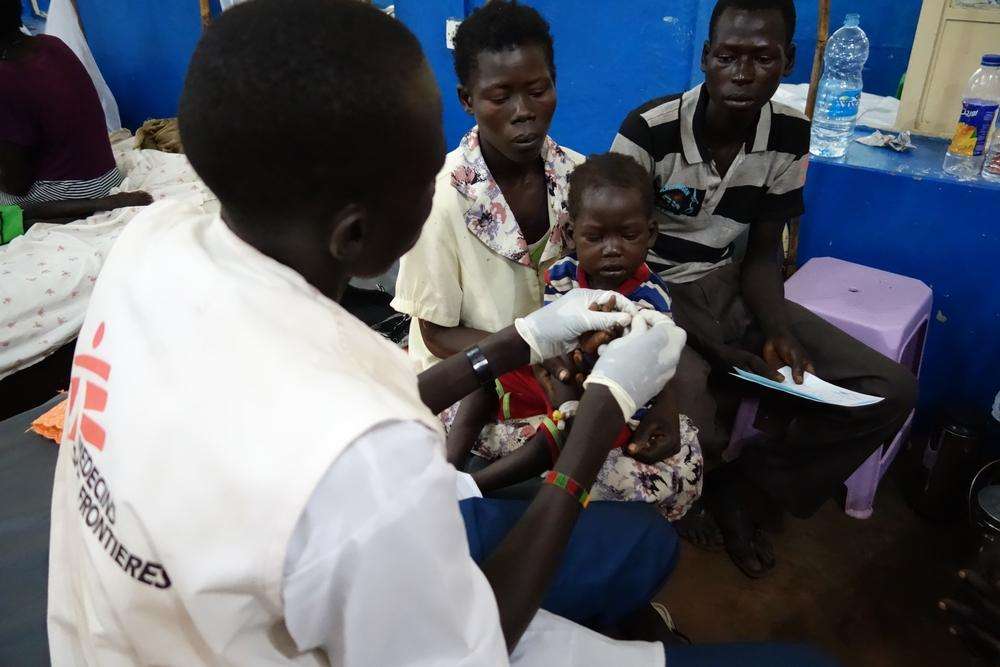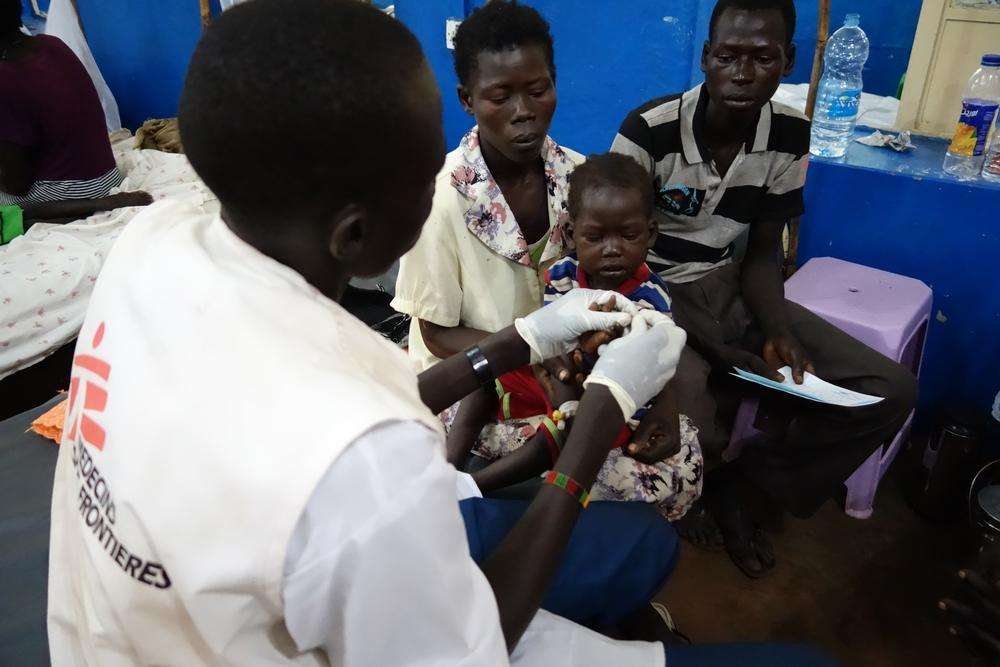Lying on her side surrounded by family, five-year-old Achan opened her eyes for the first time in almost five days. Achan’s family has been by her bedside continuously since she was admitted to the Doctors Without Borders/Médecins Sans Frontières (MSF) pediatric ward in Aweil Hospital, located in the malaria-prevalent northwestern quarter of South Sudan.
The hospital is the main referral point for the most serious medical cases in South Sudan’s Northern Bahr Al Ghazal State. In the hospital, MSF has over 160 hospitalization beds, including three pediatric wards which have been at full capacity for the last two months.
"Some Children . . . Don't Ever Fully Wake Up"
When Achan arrived to the hospital, she was comatose, her small body convulsing with seizures and wracked with a fever of nearly 104 degrees. “All of us were afraid she was going to die,” says her father, gesturing to the five family members around Achan’s bed.
It was a great relief when she awakened, but her prognosis remains unclear. Her fever has dropped, but she is still having periodic convulsions. Patients emerging from a cerebral malaria coma often suffer permanent brain damage.
“Sadly, some children go into a coma and don’t ever fully wake up,” says MSF medical referent Dr. Cameron Bopp. When Achans eyes do open, they appear vacant. She cannot eat or speak.
On the opposite side of the hospital, three-year-old Ajeth sits in her mother’s arms as a South Sudanese medical staff member pricks her finger to test the child’s blood iron. Ajeth was admitted to the hospital three days ago in severe condition with complex malaria. She was suffering from high fever, anemia, and diarrhea. MSF staff treated her with an injectable malaria treatment, an intravenous drip for rehydration, and a blood transfusion to stave off the anemia.
Now Ajeth is doing much better. The malaria has subsided and her blood iron test is good. She is ready to go home. Her parents do not have money for public transport, so MSF gives them high-energy biscuits so Ajeth will at least have food for the long trip. It’s an eleven-hour walk.
“Last year, my son had malaria too, so I also brought him to MSF,” Aieth’s mother explains. “In our village, the issue of malaria this year and last year is very serious.” In 2014, the western half of South Sudan was hit with an extraordinarily severe malaria season. In some MSF projects, the number of patients was more than triple the figures from previous years.
A Spike in Cases
This year, malaria is spiking again. In the first three months of the malaria season, MSF projects in the northwest of the country are treating just as many severe malaria patients as they did last year. What’s more, this year’s rainy season has been slow to arrive. If the rains pick up, the number of malaria cases is likely to increase even more.
Already, nearly 60 percent of admissions to the MSF project in Aweil are malaria cases. MSF is setting up a 20-bed overflow tent in the back of the hospital in preparation for even more patients in the coming months.
The health consequences of a second malaria spike across the region could be severe. The only other hospital in Northern Bahr Al Ghazal is a one-hour drive from the MSF project in Aweil down a dirt road flanked by flat fields of sorghum and shallow pools of stagnant water.
Dwindling Stocks
At the hospital, it’s a sunny morning and the 20-bed inpatient ward is packed with patients and a line is forming at the door. Outside the ward, intravenous bags hang from trees like fruit. Already, a handful of patients who can’t get beds inside the ward are being hooked up to intravenous drip from low-hanging branches.
Thankfully, the hospital still has some drugs. Last year, many health care facilities ran out of malaria treatment entirely. Earlier this week, this hospital ran out of medicine for simple malaria cases, but they still have intravenous quinine for treating severe patients. They expect a new three-month shipment of medicines from the capital in the next few days.
“The state ministry of health has created a malaria task force to improve coordination,” says Adbi Fatah Mohammed, MSF’s outreach manager. “But capacity is a serious problem and there is a risk of running out of drugs later in the season.”
It’s unclear whether the present spike in malaria in this part of the country will continue to rival the 2014’s enormous volume of cases, but trends and statistics mean little to those who are already suffering. Back in the MSF inpatient ward, dozens of young patients lie in metal beds on foam mattresses. It is evening and the ward is silent.
A South Sudanese medical staff member walks between two rows of sleeping children with a clipboard, checking on each one of them. At the back of the ward, Achan sleeps with a transparent feeding tube protruding from her small, delicate nose. She has completed the final dose in her seven-day regimen of malaria treatment and her eyes are flickering open and closed. She has still not spoken. Achan’s family spends another long night at the hospital beside her.
Read More: Another Exceptionally Harsh Malaria Season Looms in South Sudan





